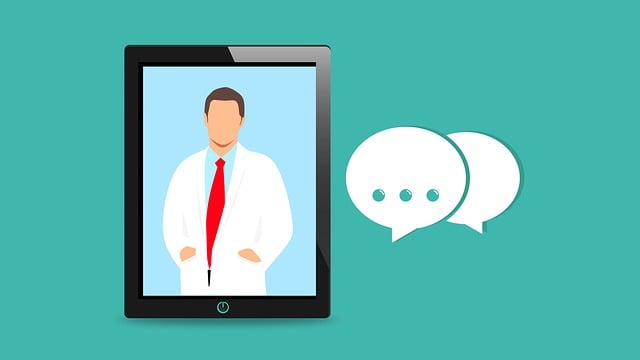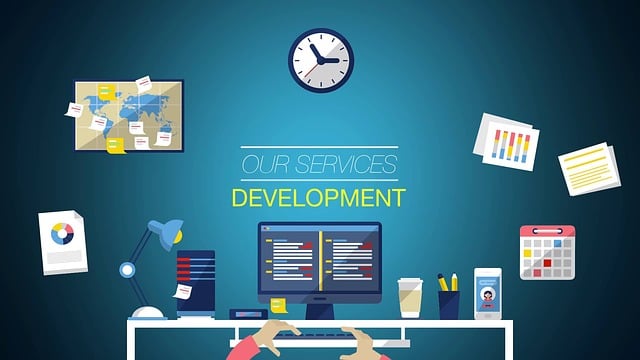In today's competitive healthcare market, a full-service medical marketing strategy using integrated digital channels (SEO, content creation, social media) is crucial for success. Healthcare marketing services focus on building trust, educating patients, and differentiating providers through strategic online and offline tactics. This includes SEO for visibility, social media engagement, email campaigns, data analytics for insights, and strategic partnerships to enhance brand reputation and patient retention. Digital marketing is essential to stay ahead in the industry, with opportunities through SEO, social media, and targeted advertising for attracting and retaining patients. Measuring KPIs ensures campaign effectiveness and guides future strategies. Key trends driving medical marketing include increasing digital reliance and technology integration (AI, data analytics) for personalized patient interactions and improved outcomes.
In today’s competitive healthcare landscape, effective medical marketing is no longer an option but a necessity. This comprehensive guide explores full-service medical marketing—a holistic approach that encompasses both digital and traditional strategies to engage patients and elevate healthcare practices. We delve into the critical role of healthcare marketing services in building patient relationships, uncovering key components for successful campaigns, and highlighting emerging trends. By understanding these elements, healthcare providers can harness the power of marketing to drive growth and improve patient outcomes.
Understanding Full-Service Medical Marketing: A Comprehensive Overview

In today’s competitive healthcare landscape, a full-service medical marketing approach is becoming increasingly vital for medical practices and healthcare organizations to thrive. Full-service medical marketing encompasses a wide range of integrated services designed to enhance brand visibility, engage target audiences, and ultimately drive patient acquisition and retention. This strategic marketing model goes beyond traditional tactics by offering a comprehensive suite of solutions tailored to the unique needs of healthcare providers. From brand development and digital strategy to content creation, social media management, and patient relationship management, each aspect is meticulously crafted to create a cohesive and effective marketing campaign.
By leveraging various healthcare marketing services, medical professionals can effectively communicate their expertise, establish trust with patients, and differentiate themselves in a crowded market. These services include search engine optimization (SEO) to boost online visibility, email marketing for personalized communication, and social media campaigns to build community engagement. Additionally, data analytics plays a pivotal role, allowing marketers to track patient journeys, measure campaign success, and make data-driven decisions. With a full-service approach, healthcare providers can ensure their marketing efforts align with their medical expertise, fostering a seamless and impactful connection with potential and existing patients.
The Role of Healthcare Marketing Services in Patient Engagement

In today’s digital age, healthcare institutions face a unique challenge: engaging and communicating with patients effectively. This is where healthcare marketing services step in as a powerful tool. By employing strategic marketing techniques, these services play a pivotal role in building strong patient relationships and fostering trust. Through various channels like online platforms, social media, and targeted campaigns, healthcare marketers can deliver valuable information, educate the public about health issues, and promote specific medical practices or facilities. This approach ensures that potential patients are reached where they spend their time, increasing the likelihood of engagement and interest.
The ultimate goal is to create a patient-centric environment where individuals feel empowered to take control of their health. By providing informative content, answering frequently asked questions, and offering easy access to appointments or medical records, healthcare marketing services contribute to improved patient satisfaction and retention. Additionally, these services help institutions stay visible, build a positive brand image, and differentiate themselves in a crowded market, ultimately leading to better patient outcomes and increased loyalty.
Key Components of a Successful Medical Marketing Strategy

In today’s competitive healthcare landscape, a well-crafted medical marketing strategy is essential for standing out and attracting patients. The key components include a comprehensive mix of online and offline tactics tailored to engage and inform the target audience. Effective healthcare marketing services start with understanding the unique needs and concerns of potential patients, which allows for the creation of targeted content that resonates and builds trust.
Digital marketing plays a pivotal role, leveraging search engine optimization (SEO) to boost visibility and attract organic traffic. Social media engagement, email campaigns, and mobile-optimized websites are also crucial elements in reaching a broader audience. Additionally, strategic partnerships with local businesses or healthcare influencers can amplify reach and credibility. Off-line strategies such as direct mail, community events, and patient testimonials reinforce the online efforts, creating a cohesive and compelling narrative that fosters a strong relationship between healthcare providers and their patients.
Digital Marketing for Healthcare: Reaching Patients Online

In today’s digital era, healthcare providers must adapt to stay competitive. Digital marketing for healthcare offers a powerful way to reach patients online and build strong connections with them. By leveraging various channels such as search engine optimization (SEO), social media marketing, email campaigns, and content creation, medical practices can enhance their visibility, engage potential patients, and establish themselves as trusted authorities in their field.
Effective digital healthcare marketing services focus on creating valuable content that educates and informs potential clients about specific conditions, treatments, and wellness tips. This involves optimizing websites for search engines to rank higher in relevant queries, running targeted social media ads to reach demographically specific audiences, and crafting compelling email newsletters to keep patients engaged and informed. Such strategies not only attract new patients but also foster stronger relationships with existing ones.
Traditional Marketing Techniques for Medical Practices

In the competitive landscape of healthcare, establishing a strong online presence is no longer an option but a necessity for medical practices. Traditional marketing techniques, while still relevant, often struggle to keep up with the dynamic nature of digital health communication. These methods typically include print advertisements in local newspapers or magazines, direct mailers targeting specific demographics, and radio or TV spots to raise awareness about services. While effective in reaching a broader audience, these tactics may not effectively showcase the unique aspects of healthcare providers, such as specialized treatments or patient testimonials.
To stay ahead in today’s digital era, medical practices need comprehensive healthcare marketing services that go beyond traditional boundaries. Online platforms offer an unparalleled opportunity to engage with potential patients through search engine optimization (SEO), social media campaigns, and targeted digital advertising. By leveraging these tools, healthcare providers can not only attract but also convert interested individuals into actual patients. This shift towards digital marketing ensures that medical practices can reach their target audience more effectively, build a strong online reputation, and ultimately enhance patient engagement and retention.
Measuring Success: Evaluating the Impact of Medical Marketing Campaigns

Measuring success is a critical component of any medical marketing campaign, allowing healthcare marketers to assess the effectiveness of their strategies and make data-driven decisions for future initiatives. Key performance indicators (KPIs) specific to healthcare marketing services vary depending on the campaign objectives but often include website traffic, patient engagement metrics, conversion rates, and referral generation. By tracking these KPIs, marketers can gauge how well their campaigns are reaching target audiences and driving desired actions, such as scheduling appointments or seeking medical advice.
For instance, a successful email marketing campaign for a specialized clinic might result in a significant increase in newsletter subscriptions and subsequent appointment bookings. Social media campaigns could see a rise in website referrals and patient inquiries through targeted ads. Analyzing these impacts enables healthcare marketers to refine their strategies, optimize content, and choose the most effective channels for future outreach efforts, ultimately improving overall campaign performance and patient engagement.
Trends Shaping the Future of Full-Service Medical Marketing

The future of full-service medical marketing is being shaped by several key trends that are transforming how healthcare organizations connect with their audiences. One prominent trend is the increasing reliance on digital channels for healthcare marketing services. With more people turning to the internet for health information and service providers, online platforms offer vast opportunities for reaching potential patients and building brand awareness. This shift necessitates a strategic approach to digital marketing, including search engine optimization (SEO), content creation, and social media engagement, all of which are crucial for establishing a strong online presence.
Another significant trend is the integration of technology, particularly artificial intelligence (AI) and data analytics, into healthcare marketing. AI-powered tools can personalize patient interactions, automate marketing tasks, and provide valuable insights into consumer behavior. By leveraging data analytics, medical marketers can make informed decisions about campaign effectiveness, refine targeting strategies, and ultimately improve patient outcomes. These technological advancements are reshaping the landscape of healthcare marketing services, enabling more precise, efficient, and impactful communication with patients.
